Danish-Polish Environmental Co-operation 1991-2000
Chapter 10
Waste - a problem for the environment
Waste
management and recycling in Podhale Region, Poland
Ship-generated Waste
Waste is one of the largest environmental problems of the Polish society. Over the last 15 years the quantity of waste landfilled in Poland has doubled. The damage done by waste to the environment takes first of all the form of water and soil pollution but also values of the landscape are hit hard by the enormous amounts of waste. However, there is a tendency among companies and local governments to show a growing care for the correct and sustainable waste management. This is for instance seen with the increasing number of plants disposing of generated waste and new municipal investment projects.
In the 1990s, as the standard of living and diversity of consumer goods increased, the growing quantity of municipal waste became a great problem in Poland. The most common method of waste disposal in Poland was dumping. Still, only a marginal percentage of the solid waste is disposed of by means of other methods such as composting and recycling, which was only 0.2 per cent in 1997.
Nevertheless, overall there is a distinct positive tendency in the nation's recycling and recovery efforts.
Most of the municipal waste was and is disposed of on legal authorised landfills and dumps. However, in spite of the growing environmental awareness among citizens, part of the waste also goes to unauthorised dumps, which have no binding legal permits. It is estimated that there are about 10,000 unauthorised dumps in Poland.
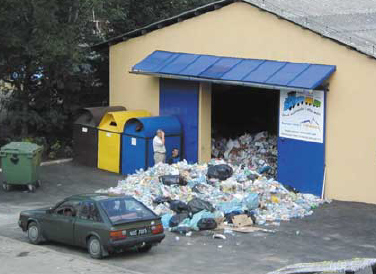
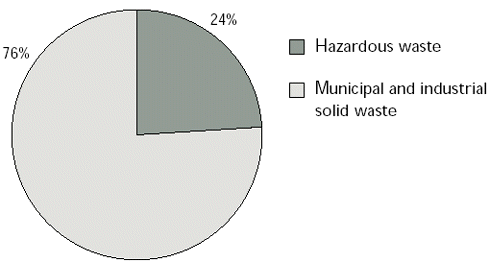
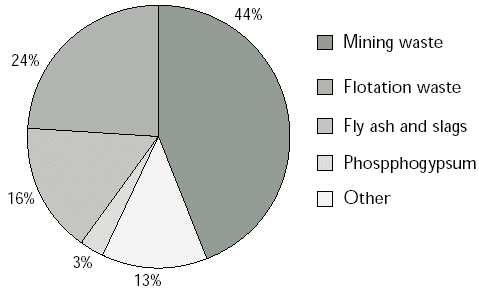
Distribution of Industrial Waste (11).
In an attempt to solve the serious waste problems most of the existing projects have involved technical assistance for the municipal waste management planning in Polish cities. However, investment projects have also been implemented in which new treatment technologies have been demonstrated such as composting and recycling.
Too much waste
Focusing on the environmental effects of the projects, the landfill capacity created by the projects is approximately 350,000 tonnes. This can be compared to Poland's annual municipal waste generation, which amounted to approximately 30,000,000 tonnes in 1997.
Due to changes in the economy the production of industrial solid and hazardous waste changed significantly during the period 1985- 1997 by decreasing from as much as 170 million to the present 125 million tonnes. The hazardous waste quantities constitute approximately 3-6 per cent of the industrial waste.
Unfortunately, it can be difficult to be very precise in the presentation of the changes in the area of waste management, which have taken place over the last 10 years. The reason for this is that the data until 1997 and after 1998 are not comparable, since the Act on Waste adopted in 1997 provided a new classification of waste, dividing them into 19 groups and municipal waste depending on the generating source. But it seems that the municipal waste production and the quantities of industrial waste, in spite of the increasing consumption, have been stable during the nineties.
Waste management and recycling in Podhale Region, Poland
Every year, around 2 million tourists visit the Podhale region. This tourist migration causes problems for the environment and for the waste management in the area. Therefore, the DANCEE assists the region in the establishment of the installation of equipment for the recycling of materials and organic waste and in the construction of a new controlled landfill site for the five municipalities in the Podhale region.
For more than 150 years, the small town of Zakopane, situated at the foot of the Tatra mountains, has been attractive for both the Polish and international tourists. It is mainly due to the nature and to the fact that the Tatra mountains are the only mountain range between the Alps and Caucasus which have alpine character. The area is therefore one of the most important sports and tourist attractions in Poland.
Zakopane has around 30.000 inhabitants and is visited every year by around 2 million tourists. Together with the surrounding municipalities, Zakopane constitutes the Podhale Region. Unfortunately, the area is very polluted as a result of the heavy human activity and the amount of waste produced by all the tourists.
To improve the environmental condition for the inhabitants, the tourists and the magnificent wildlife in the Tatra National Park and its surroundings, Dancee assists in solving the waste problems which is one of the main sources of the environmental pollution in the region.
The process of waste treatment today is outdated and does not comply with neither the Polish nor the EU environmental legislation.
Despite the fact that the Town Council has studied the possibilities of constructing a new monitored landfill and establishing a recycling depot, it is not possible to develop the plan further due to the lack of financial resources. In Poland, the local municipalities receive only 5 per cent of the taxes, the rest goes to the state. Therefore, it is not possible for small communities like the ones in the Podhale region to invest in and improve the environment. Therefore, the DANCEE support is crucial for the region.
The objective:
The specific objective of the project is to supply and install equipments for recycling of materials and organic waste and to construct a new controlled landfill site for the five municipalities in the Podhale region.
The project will have a high demonstration value with a possible duplication effect in a range of municipalities all over Poland.
The environmental benefits are doublesided as recycling of materials and protection of the flora and wildlife in the Tatra National Park are elements in the project.
The project will be implemented in The Podhale Valley including the five municipalities Koscielisko, Zakopane, Bialy Dunajec, Poninin and Bukowina Tatrzanska, with a total of 65.000 inhabitants.
The procedure:
The first visual sign of the DANCEE support was an Environmental Car, which was delivered to the Zakopane waste management company - TESKO. The car, which is the first of its kind in Poland, collects waste from among others doctors and dentists, such as medicine leftovers and used syringes and needles, used batteries, accumulators, chemicals, oil and other kinds of hazardous waste. The waste from the Podhale region is transported to Krakow where it is disposed of in an environmentally correct way.
The result:
The project has so far contributed to the reduction of the amount of waste and thereby avoided pollution of the mountains and the nature in the Tatra National Park.
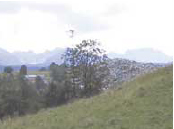
Mountains of Zakopane.In the foreground a growing mountain of waste
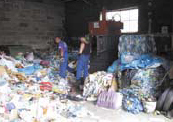
Inside the recycling station
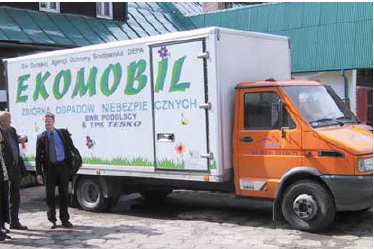
The Environmental Car
Ship-generated Waste
The protection of the marine environment in the Baltic Sea area against the impact of the pollution from various types of shipgenerated waste is regulated by specific national legislation as well as by international conventions for marine environmental protection. This means for instance that vessels shall deliver their waste to the reception facilities in the calling ports. Denmark and Sweden assist the Baltic countries and Poland in the development of technical and operational structures for reception, transportation and treatment of shipgenerated waste a so-called "no-special-fee" system.
Vessels in operation produce waste. Depending on the type of vessel different types of waste are produced. All ships produce "engine room slop", sewage and garbage. Tankers produce additionally cargo slop, tank washing and ballast water. According to the MARPOL 73/78 Convention vessels shall deliver their waste to the reception facilities in the calling ports, and the signatories to the MARPOL Convention shall provide adequate facilities in their ports. To fulfil the standards in the MARPOL Convention Denmark and Sweden are giving technical and operational assistance to Poland.
The objective:
A common objective of the strategy in the Baltic area is the introduction of a harmonised fee system for the use of the reception facilities. Denmark is well known for the development of such reception facilities and the project is thus part of the larger programme on promotion of reception facilities in the Baltic Sea.
In order to achieve this overall objective Denmark has supported the immediate objective of the development of the port facilities in Szczecin-Swinoujscie. The project can be considered as a demonstration project for the sustainable development of reception, transport and treatment of waste received or generated in harbours.
The procedure:
The project idea for a processing plant for the treatment of ship generated waste water was already created in 1992 with the planning of the new biological waste water treatment plant on Ostrow Grabowski Island at the harbour of Szczecin. The DANCEE supported the planning phase including the preparation of the conceptual design of the waste water treatment plant. In August 1994 DANCEE granted DKK 8,265 million (USD 0,98 million) for stage I of the project. The project was finalised in 1999 and the plant is today in full operation.
Later a pre-feasibility study for Polish ports, including the Sczcencin- Swinoujscie Harbour in 1995 identified the need for supplementary facilities and reorganisation including consideration regarding the fee structure, the economic justification of waste treatment and handling, the motivation of the ships as well as the legal aspects.
In 1997 the EU-PHARE donated approximately USD 1.02 million for a processing plant and harbour facilities as part of the reception, transportation and treatment facilities for shipgenerated waste water in the same port. Subsequently, the ECO Fund in Poland donated PLN 1.12 million (USD 0.26 million) for the equipment supply and construction works for the same project.
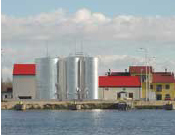
Szczecin ship waste water treatment plant.
To comply with the MARPOL 73/78 and the HELCOM recommendations the port authorities have to prepare a Port Waste Management Plan and establish facilities for treatment of other types of waste.
The result:
DANCEE financed the initial technical assistance for the project covering the preparation of the Project Outline Report and Conceptual Design as well as Technical Specifications of the reception, transportation and treatment facilities to be financed by the EU-PHARE and the ECO Fund. This part of the project was commissioned in late 1999. The detailed design of the harbour facilities as well as the civil works were financed locally.
The DANCEE support included also the preparation of the Port Waste Management Plan, which will support the sustainable development further. The plan is expected to be completed during 2001.
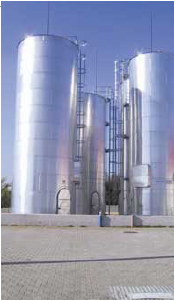
The ship waste water are contained and treated in steeltanks
11 Agenda 21 in Poland, Progress Report 1992-98, MoE, 1998